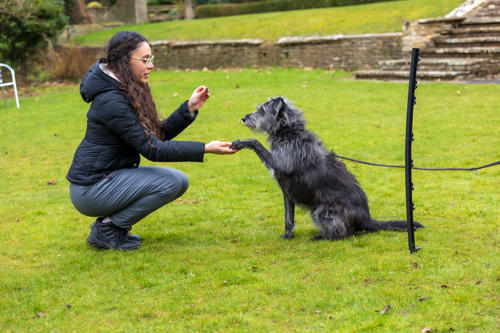Hartpury University is the only provider in the UK recognised by the Animal Behaviour and Training Council to cover the knowledge and understanding required for all practitioner levels that can be achieved as a trainer/behaviourist, meaning, if you’re interested in attaining any of the following practitioner levels, Hartpury University’s courses are ideal for you.
Animal Trainer (AT)
Works directly with an animal to train them to carry out required behaviours. May work in conjunction with ATI, ABT, AAB (Accredited Animal Behaviourist), CAB or VB (Veterinary Behaviourist) to ensure that the highest standards of welfare are maintained.
Animal Trainer Instructor (ATI)
Teaches owner/handler how to train their animal to carry out required behaviours – e.g. dog training classes. May work in conjunction with AT, ABT, AAB, CAB or VB to ensure that the highest standards of welfare are maintained.
Animal Behaviour Technician (ABT)
Works with owner/handler and animal to prevent problem behaviours and to provide behavioural first aid. Works with AAB, CAB or VB to implement behaviour or environmental modification plans, following an assessment/evaluation by the AAB, CAB or VB; may also work on cases in conjunction with an AT or ATI for training, to ensure that the highest standards of welfare are maintained.
Clinical Animal Behaviourist (CAB)
Works with owner/handler and animal to address unwanted behaviours, including all types of undesirable, inappropriate, problematic or dangerous behaviours, on veterinary referral. May work on cases in conjunction with ABT for implementation of behaviour or environmental modification plans; or with AT or ATI for training, to ensure that the highest standards of welfare are maintained.
Want to practice in any of these areas?
You’ll get assessed on your knowledge and practical skills, and Hartpury University offers a range of opportunities through our courses to develop the required knowledge and nurture practical skills to pass the assessment.

Which of our courses can you study?
Animal Behaviour and Training (Clinical) (ABTC)
All modules in Hartpury University’s BSc (Hons) Animal Behaviour and Training (Clinical) support the development of an in depth understanding of the key topics in the field of animal behaviour and training. Core subjects will range from management and training of the animal to the physiology of animal behaviour. Engagement with practical activities, industry placements and real-world case studies throughout the course will prepare you for a future career in a diverse sector - from routine training for husbandry right through to managing animals with problematic behaviours. Specific animal work placements are undertaken to support professional and academic skill development.
This course and its training are underpinned by the strictest ethics and supported by the latest scientific evidence. You’ll learn from the latest advances in the field and use industry-standard technologies.
Animal Behaviour and Training with Canine (Clinical) (ABTCC)
All modules in Hartpury University’s BSc (Hons) Animal Behaviour and Training with Canine (Clinical) support the development of an in depth understanding of the key topics in the field of animal behaviour and training. Core subjects will range from management and training of the animal to the physiology of animal behaviour. Engagement with practical activities, industry placements and real-world case studies throughout the course will prepare you for a future career in a diverse canine sector - from routine training for husbandry right through to managing animals with problematic behaviours. Specific canine work placements are undertaken to support professional and academic skill development.
This course and its training are underpinned by the strictest ethics and supported by the latest scientific evidence. You’ll learn from the latest advances in the field and use industry-standard technologies.
After you successfully complete our ABTC/ABTCC course, you’ll need to join a practitioner organisation for a practical skills assessment.
Hartpury University nurtures practical skills, helping students to:
- Be prepared for the practical skills assessment following graduation with a practitioner organisation of their choice.
- Improve employability prospects through a holistic approach to skills development and industry connections.
Some graduate career prospects include:
- Clinical animal behaviour work (self-employed)
- Animal training (self-employed)
- Service dog handling
- Animal warden/officer
- Assistance work
- Rescue and rehabilitation








